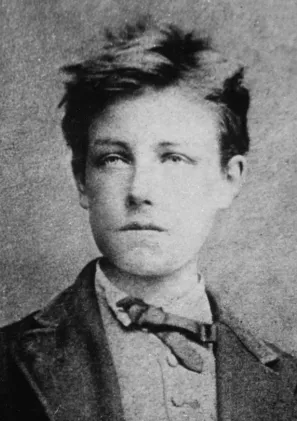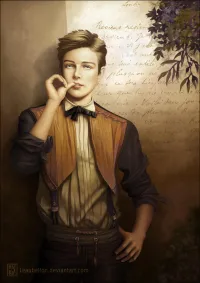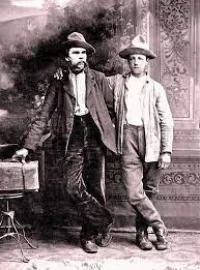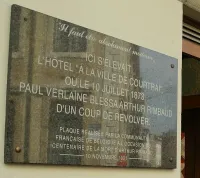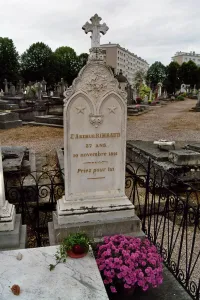Biography
1854 - 1891
“Life is the farce which everyone has to perform.”
– Arthur Rimbaud
Arthur Rimbaud was born October 20, 1854, in Charleville, France. His father abandoned the family when he was six. At a young age, Arthur was shown to be clearly brilliant, but many people said there was something about him they did not like. When his school shut down during the Franco-Prussian War, young Rimbaud sought adventure. After running away several times he ended up in Paris where the 16 year old lived on the streets. Eventually he wrote the symbolist poet Paul Verlaine and included a copy of his poem The Drunken Boat. Verlaine invited him to live with him and his wife, but the insulting young poet quickly made himself unwelcome. Soon he and Verlaine became lovers and eventually Verlaine left his family to live with Rimbaud. Their volatile affair was filled with absinthe, hashish, and even greater debauchery, leaving the Paris literary community scandalized. Yet, almost all Rimbaud’s poetry was written during this turbulent time. After eighteen combative months together their relationship ended when a drunk and hysterical Verlaine shot Rimbaud in the hand and was sentenced to two years in prison. In the aftermath Rimbaud returned to Charleville and wrote large portions of A Season in Hell, considered one of the first works of free verse. In 1874, he finished work on his free verse autobiographical work, Illuminations. At 19, the libertine stopped writing poetry completely, choosing instead a life of action. An incessant traveler, Rimbaud eventually became a colonial tradesman in Africa. After 1875, his only surviving writing is documents and letters. His travels, the climate, and his work undermined his health. In 1891, he noticed a pain in his knee. By the time it was finally examined, doctors were forced to amputate his leg but the cancer continued to spread. He died on November 10, 1891 at age 37, oblivious to the huge impact his verse would one day have. In 1895, Verlaine published Rimbaud’s complete works, thus securing his former lover’s immortal fame.
1854 - 1891
“Life is the farce which everyone has to perform.”
– Arthur Rimbaud
Arthur Rimbaud was born October 20, 1854, in Charleville, France. His father abandoned the family when he was six. At a young age, Arthur was shown to be clearly brilliant, but many people said there was something about him they did not like. When his school shut down during the Franco-Prussian War, young Rimbaud sought adventure. After running away several times he ended up in Paris where the 16 year old lived on the streets. Eventually he wrote the symbolist poet Paul Verlaine and included a copy of his poem The Drunken Boat. Verlaine invited him to live with him and his wife, but the insulting young poet quickly made himself unwelcome. Soon he and Verlaine became lovers and eventually Verlaine left his family to live with Rimbaud. Their volatile affair was filled with absinthe, hashish, and even greater debauchery, leaving the Paris literary community scandalized. Yet, almost all Rimbaud’s poetry was written during this turbulent time. After eighteen combative months together their relationship ended when a drunk and hysterical Verlaine shot Rimbaud in the hand and was sentenced to two years in prison. In the aftermath Rimbaud returned to Charleville and wrote large portions of A Season in Hell, considered one of the first works of free verse. In 1874, he finished work on his free verse autobiographical work, Illuminations. At 19, the libertine stopped writing poetry completely, choosing instead a life of action. An incessant traveler, Rimbaud eventually became a colonial tradesman in Africa. After 1875, his only surviving writing is documents and letters. His travels, the climate, and his work undermined his health. In 1891, he noticed a pain in his knee. By the time it was finally examined, doctors were forced to amputate his leg but the cancer continued to spread. He died on November 10, 1891 at age 37, oblivious to the huge impact his verse would one day have. In 1895, Verlaine published Rimbaud’s complete works, thus securing his former lover’s immortal fame.
Demography
Demography
Gender Male
Sexual Orientation Gay
Gender Identity Cisgender
Ethnicity Caucasian/White
Nations Affiliated Ethiopia France Yemen
Era/Epoch Victorian Era (1837-1901)
Field(s) of Contribution
Business
Poet
Demography
Gender Male
Sexual Orientation Gay
Gender Identity Cisgender
Ethnicity Caucasian/White
Nations Affiliated Ethiopia France Yemen
Era/Epoch Victorian Era (1837-1901)
Field(s) of Contribution
Business
Poet
Resources
Resources
Resources
